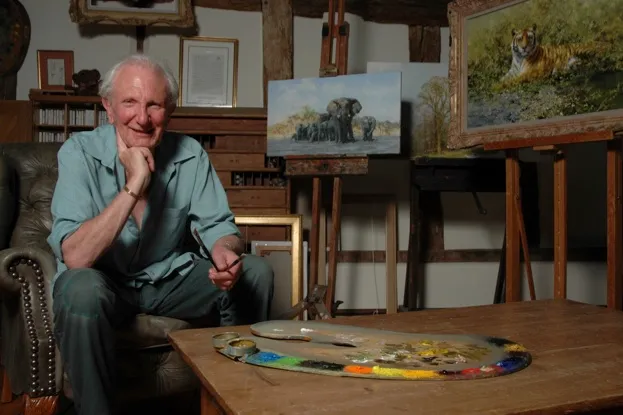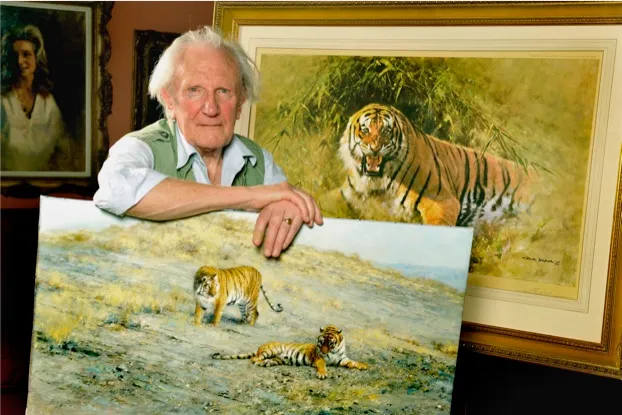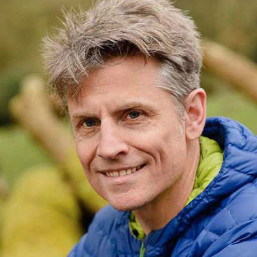DSWF supports law enforcement work to protect elephants in Zambia © DSWF
David Shepherd, who has died at the age of 86, founded the wildlife conservation group that bears his name in 1984.
Bankrolled by his paintings, which sold for thousands of pounds, the David Shepherd Wildlife Foundation (DSWF) has initiatives in Africa and Asia that help protect some of the world’s most iconic and best-loved species – elephants, leopards, tigers, lions and rhinoceroses, as well as less well-known pangolins.
In more than 30 years, he helped the foundation raise more than £5m, most of which has gone directly into grassroots conservation projects.
In Russia, for example, DSWF part-funds anti-poaching teams that patrol five core Amur tiger breeding sites. It also contributes to education programmes that have reached more than 40,000 children in the past 13 years.
In Vietnam, DSWF has supported campaigning by WildAid to reduce demand for rhino horn. The demand for horn has led to the poaching crisis affecting mainly black and white rhinos in Africa.
But interviewed by BBC Wildlife in 2011, David put his considerable achievements down to luck.
He explained how he originally wanted to be a game warden, and travelled to Kenya on the strength of this ambition. “When I arrived in Nairobi, I knocked on the door of the head warden, and said, ‘Can I be a game warden?’ He said no, and I went back to England full of shame.”
David then decided he wanted to be an artist (it was either that or drive buses). “I’d done one painting at school, and that was merely to avoid playing rugger, because I was a weedy little boy who didn’t want to get his neck broken,” he said.
But he was rejected by the Slade School of Fine Art, and claimed his career all rested on running into the artist Robin Goodwin at a party. Goodwin agreed to look at one of his paintings, but said he wouldn’t teach him because he didn’t have the time.
‘But after seeing his work, Goodwin reportedly said: “I have never seen such a lack of talent in one painting in all my life. I must take you on as a challenge.”

David Shepherd in his studio: "I'd done one painting at school, and that was to avoid playing rugger." © Becky Thomas
David didn’t start painting wildlife until he received a commission from the RAF and was sent out to Kenya. He described how a visit to the Serengeti with his wife changed his life.
“The sky was black with vultures, and we found a waterhole that had had battery acid poured into it by a poacher,” he said. “There were more than 200 zebra lying dead on the ground, and when you see something like that, you never forget it.”
In person, David was outspoken about the causes of wildlife declines and frustrated by our inability to solve them. He described how he told a group of Taiwanese people: “If you’ve got a headache, you go to the chemist and you’ll see they’ve got rhino horn at one end of the counter and paracetamol at the other. When you’ve slaughtered the last rhino, when the very last one has gone, you’re going to have to use paracetamol anyway, so you may as well start now.”
On the issue of the world’s growing population, he said: “There’s one man who can cure all the problems in the world, and he lives in the Vatican. To go to Africa and promote no birth control is monstrous.”

“I have never seen such a lack of talent in one painting in all my life," said the artist Robin Goodwin of David's work. @DSWF
But David was also self-deprecating and funny. “I frequently got confused with David Sheppard [who was the Bishop of Liverpool from 1975-1997]. The BBC used to ring me up and ask me onto their programmes, and I’d say, ‘If I were the Bishop of Liverpool, I wouldn’t live in Godalming.’”
And he described how his appearance on This is Your Life didn’t go down well with everybody. “When we’d finished, I heard one lady say to another, ‘You know Doris, I love this programme, but that was boring, I still don’t know who the hell that was.’”
BBC Wildlife columnist, the writer and photographer Mark Carwardine, said: “David did more for conservation than almost anyone I know.”
Mark first met him when he was working at WWF, where David was a trustee. "He had so much energy and enthusiasm and charisma that when he left the room, it felt like as if a tornado had just passed through."
David himself professed not too know that much about wildlife, saying he didn't want to learn what an elephant eats but just to stop the ivory trade.
"I'd like to be remembered as someone who did their bit for wildlife," he said. "And my ego is so enormous, I want to be there at my memorial service to see what they say about me."
